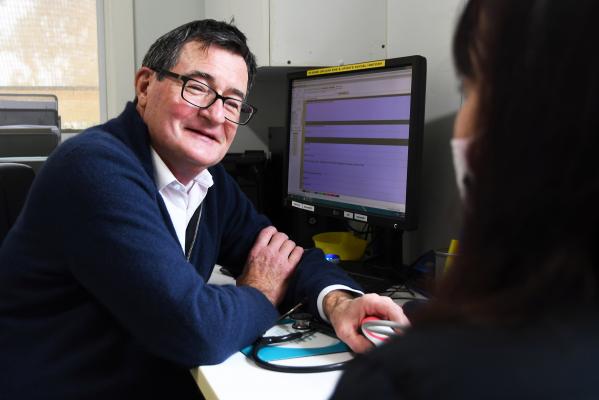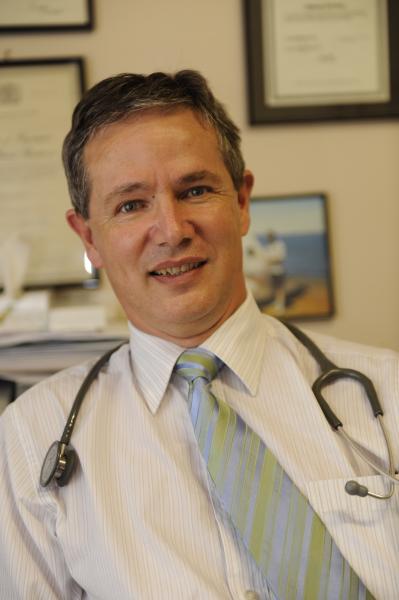
Last week, Australia experienced a record-breaking vaccination week, with 880,807 people receiving a Covid-19 jab, an increase of 48,000 over the previous best week. That being said, confusion in the community is high when it comes to the vaccine rollout, with updated messages and recommendations coming through every few weeks. Gazette journalist SHELBY BROOKS caught up with some local doctors to hear their thoughts about the Covid-19 vaccine roll-out within the Cardinia community.
Dr Geoffrey Campbell, Bunyip Medical Clinic
Dr Geoffrey Campbell described trying to convince some people to get a Covid-19 vaccine as a “pain in the butt”.
“A big drag at the moment is to try and convince people to have a Covid-19 shot,” he said.
“You get sick of telling people the same stuff when they’ve already made up their mind before you tell them what you think about it.
“I see an older clientele of patients, as you grow older your patient demographic grows older, so I’m basically seeing people over 60 usually.
“I think they really should be quite happy with the AstraZeneca one, no questions, no arguing.”
The Australian Technical Advisory Group on Immunisation (ATAGI) recommends Pfizer as the preferred vaccine for those under 60, due to the very small risk of clotting with the AstraZeneca vaccine.
Dr Campbell keeps up with the scientific information surrounding Covid-19 and the vaccine and is always happy to share what he’s learnt.
“I can give them lots of scientific information if they want,” he said.
“They want to argue with you but they really have no knowledge of the whole thing anyway. You’re wasting your breath almost, I think.
“If you go to someone who is not an expert, but knows a fair bit about the business or the craft that they’re in, then you pay for their opinion.”
Dr Campbell was not overly critical of the Australian government for the vaccine rollout.
“The government decided that AstraZeneca was going to be the best vaccine they could buy, and then it turns out it’s not so good,” he said.
“You can’t really criticise them for forward guessing about what’s going to be good or bad.”
Dr Campbell thought perhaps the blood clotting risk with AstraZeneca had to do with estrogen and testosterone.
Scientific studies have not yet identified a cause of the issue.
“I never heard anyone say that but I know that for a fact one of the things that estrogen does is make your blood clot and the reason that it works like that is for women in childbirth,” he theorised.
“Women used to bleed a lot, and that’s why people in history used to die in childbirth so evolution has sort of dictated that the estrogen your body produces helps your blood to clot.
“So you’re in a pro-clotting state until you hit menopause which is usually in your 50s.
“But that point hasn’t been made but I think that’s maybe what’s going on. It’s not proven by any evidence, I don’t have any data but you’re allowed to think about why things might be and why it may not be.
“With men, I think it’s probably with lots of testosterone, your blood clots more, which is beneficial to warriors, men going out to battle and chopping other’s legs and arms.
“And if you have lots of testosterone, you were less likely to bleed to death.”
Dr Malcolm McCowan, Station Street Medical Clinic Pakenham.
“We’re certainly immunising as quickly as we can,” Dr Malcolm McCowan said.
“There has been, and continues to be, some hesitancy but a lot of the elderly have been very keen to be immunised, there has been quite a good uptake for that.
“Though there are some people who I cannot convince that they are far safer to get the vaccine than they are to risk catching Covid-19.”
Dr McCowan said AstraZeneca was considered a “very safe” vaccine.
“Your chances of dying from the AstraZeneca vaccine are about the same chances of you dying in a car accident on the way to the doctors to get it, or on the way back from the doctors having got it,” he said.
“No one thinks twice about getting in a car.
“Having said all of that, the risk of getting a clot in the under 50s is about twice as many as it is for over 50s, but it’s still very safe.
“The chances of you dying if you get the AstraZeneca vaccine are under one in two million but we have a vaccine that would appear to not cause deaths [Pfizer], so if that’s available that is the one you’d be wanting to use.”
Dr McCowan said although there are be a few ‘anti-vaxxers’ in the community, most people seemed to want an immunisation.
“There’s always a few but I don’t think we have a high proportion at all, I’d say most people are keen to get their vaccine, they just want to be immunised with the safest vaccine,” he said.
“People’s hesitancy is because you could get a clot and the other because it is an untested vaccine.”
But Dr McCowan said for a vaccine to be considered fully tested, about 5,000-10,000 people are given the jab.
“The AstraZeneca vaccine I’m guessing has been used on 100s of billions of people,” he said.
“We know what problems it has. We know the vaccine prevents serious Covid-19 and therefore prevents death from Covid-19.“
Dr McCowan said he believed the only way to avoid another lockdown was to achieve herd immunity.
“If we get enough herd immunity, that’s three quarters of the population done and at the momentum that we’re going that will be mid-year next year,“ he said.
“If I was under 40 I would try to get the Pfizer vaccine but if there was a major outbreak in Australia today, I would try and get everyone who can to get a vaccine, no matter what it is.
“In saying that, I’ve had the AstraZeneca and I’m very happy I’ve had it.
“Now that we don’t have enough Pfizer to go around and having outbreaks again… the only way we can stop more outbreaks is to get everyone vaccinated.“
Dr McCowan had not heard similar thoughts to Dr Campbell’s about estrogen and testosterone being contributing factors to the small blood clotting risk.
“It’s an immune system mediated response and we don’t really know why but what it does is attacks the body’s platelets, drops their numbers significantly and at the same time you’re more likely to have a clot and we don’t know which people are going to do this,” he said.








